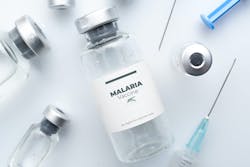The World Health Organization (WHO) has added the R21/Matrix-M malaria vaccine to its list of prequalified vaccines.
In October 2023, WHO recommended its use for the prevention of malaria in children following the advice of the WHO Strategic Advisory Group of Experts (SAGE) on Immunization and the Malaria Policy Advisory Group. The prequalification means larger access to vaccines as a key tool to prevent malaria in children with it being a prerequisite for vaccine procurement by UNICEF and funding support for deployment by Gavi, the Vaccine Alliance.
The R21 vaccine is the second malaria vaccine prequalified by WHO, following the RTS,S/AS01 vaccine which obtained prequalification status in July 2022. Both vaccines are shown to be safe and effective in clinical trials, for preventing malaria in children. When implemented broadly, along with other recommended malaria control interventions, they are expected to have a high public health impact. Malaria, a mosquito-borne disease, places a particularly high burden on children in the African Region, where nearly half a million children die from the disease each year. Globally, in 2022, there were an estimated 249 million malaria cases and 608,000 malaria deaths across 85 countries.
The prequalification of the world’s second malaria vaccine, developed by Oxford University and manufactured by Serum Institute of India, is poised to expand access to malaria prevention through vaccination. Demand for malaria vaccines is high but the supply has thus far been limited. The availability of two WHO recommended and prequalified malaria vaccines is expected to increase supply to meet the high demand from African countries and result in sufficient vaccine doses to benefit all children living in areas where malaria is a significant public health risk.

